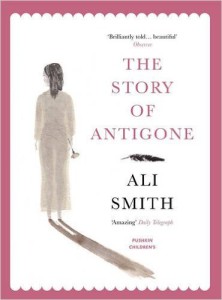Allen & Unwin
November 2015
$16.99
 It’s perhaps not the easiest thing to do, to introduce a child to the convoluted and depressing world of Greek tragedy and somehow engage them in the story. Certainly when I was subjected to Oedipus the King at the age of eleven I was bored out of my skull. Coming after the much more interesting and child-friendly histories of the feats of Heracles, anything that came in play form might as well have been a list of shampoo ingredients for the all the interest they held.
It’s perhaps not the easiest thing to do, to introduce a child to the convoluted and depressing world of Greek tragedy and somehow engage them in the story. Certainly when I was subjected to Oedipus the King at the age of eleven I was bored out of my skull. Coming after the much more interesting and child-friendly histories of the feats of Heracles, anything that came in play form might as well have been a list of shampoo ingredients for the all the interest they held.
One would imagine then that adapting Sophocles’s tragedy Antigone for younger readers would be a daunting task. It is a challenge that Ali Smith has risen to with aplomb. In her adaptation, The Story of Antigone, the tale is told from the point of view of a crow. A charming character, we are introduced to our witness at the very end of a battle as she describes how to grab a quick morsel for dinner before all the human women (the still-alives) come to collect their dead (food for crows). The theme of death, of human carcasses as things that provide sustenance to other creatures, is constant.
After a brief aside during which the crow recounts the tale of Oedipus to a puppy*, the tale of Antigone begins to play out (pun very much intended). The battle that has just ended was between Oedipus’s sons, Polynices and Eteocles, who had a disagreement over their joint kingship of Thebes. They are both dead and their uncle, Creon, is now king and declares that “Eteocles was a hero. Polynices was a zero”. Anyone caught trying to bury Polynices would totes be stoned to death.
Enter badass and general rebel against authority, Antigone and her sister Ismene. Antigone is having none of this. She won’t have her brother Polynices labelled a traitor and given less honours than Eteocles. She does her best to perform the required rites and bury her brother.
The chorus/council of elders tittle-tattle to Creon who, being the tyranty tyrant he is, sticks to his guns and decides that Antigone must die. Never mind that she is a royal princess and his flesh and blood and young and pretty and beloved by the people. He made a rule, she broke it, she has to pay the price. Creon—forgive me for being a little crude—is a dick.
While the warnings of the elders only move Creon to sentence Antigone to be walled up in a cave rather than be stoned to death, the pleadings of his own son, Haemon, change Creon’s mind too late. Antigone is dead and Haemon, who was engaged to marry her, takes his own life in despair. A jolly romp, I think you’ll agree. Or at least, the crow will.
It is a testament to the wonderful Ali Smith that she has managed to turn this tragedy into a comedy. Through the device of the crow and her preoccupation with getting a bite to eat off these damn silly humans, we see The Story of Antigone as something to shake our heads at. Rather than the relentless hair-tearing tragedy, it can more easily be seen as the silly disaster it is. A disaster that could have so easily been averted if pride and poor judgement had not been allowed to reign.
The Story of Antigone is part of the Save the Story series, which is a series of tales from around the world, retold by outstanding authors and aimed at introducing classics to children. The book itself is beautifully presented. The lovely illustrations by Laura Paoletti, in this the first book she has illustrated, are hauntingly simple stylistically. For me they held a more personal nostalgia as the style seemed to echo that found in my Greek school textbooks, where the exploits of Heracles and Zeus and Athena were introduced—just as Antigone is here—to a new generation.
*In a sort of “Previously, on The Theban Plays…” scenario

